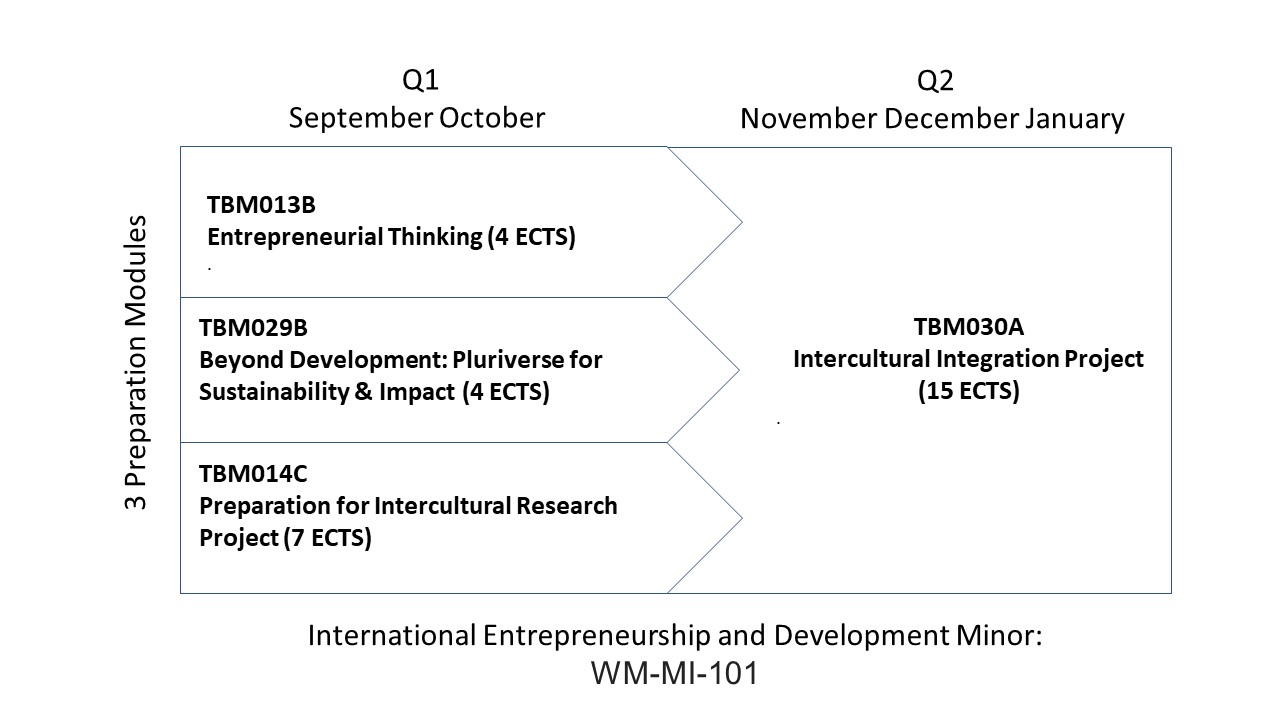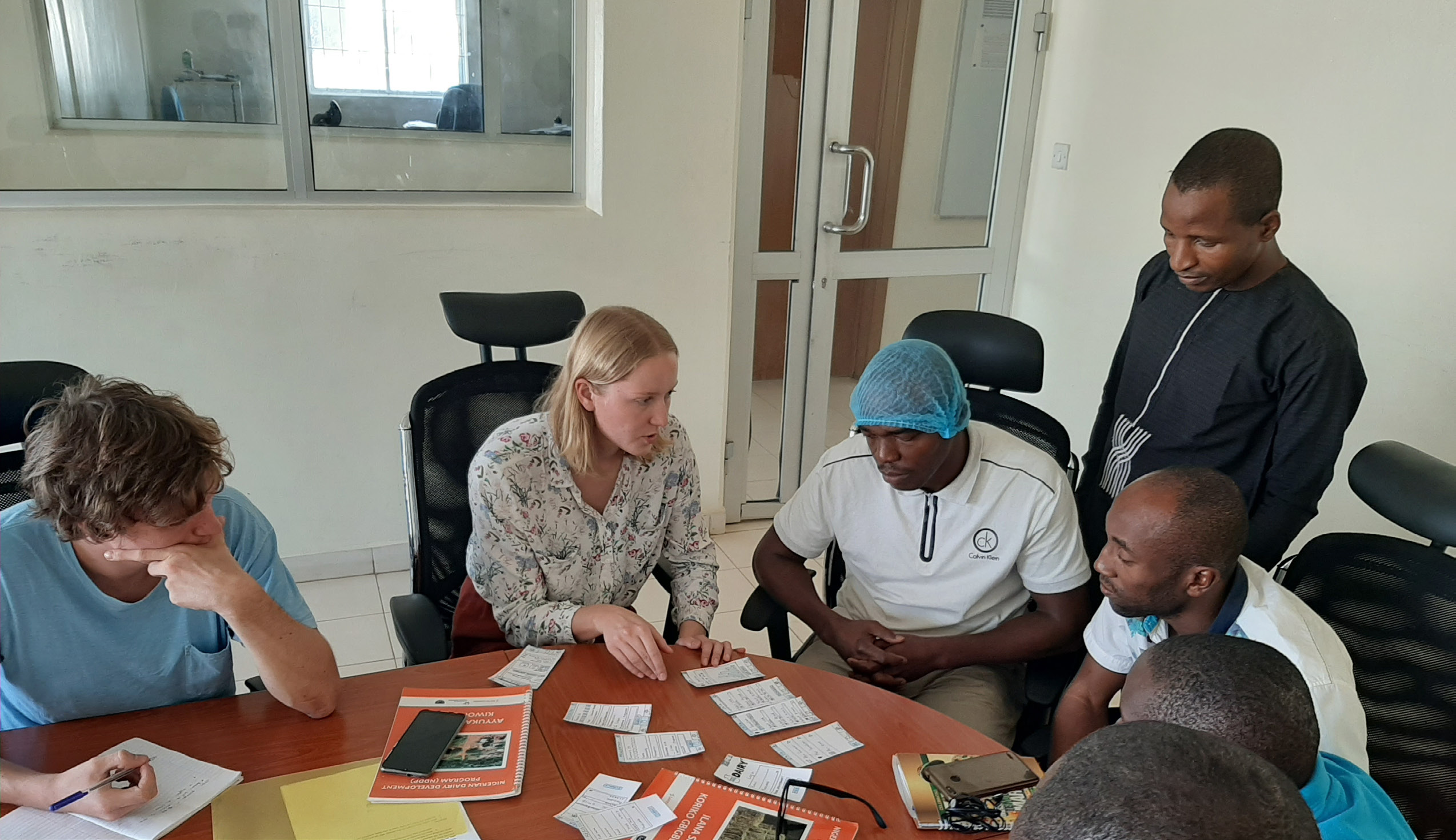International Entrepreneurship & Development
This minor program allows students to work abroad to develop technical solutions for complex challenges contributing to socioeconomic development.
During the minor, you will work in multi-disciplinary teams to solve a challenge assigned to you by a project provider. Most of these challenges are located within low income and emerging markets and focus on pro-poor growth.
With your team, you will learn how to manage and work on a technology-related project in a different cultural and institutional setting and learn.
Structure
The minor program is structured as follows:
In the first two months, students will complete a set of three courses to help prepare them for their time abroad. These courses will help students adopt an entrepreneurial mindset and prepare them to work effectively in different cultural contexts. Students will also learn how to conduct research and learn about their challenge's local ecosystem and stakeholders. Finally, they will prepare a project plan for their time abroad.
In the second phase of the minor, students will travel abroad. During their time abroad, students must adopt an entrepreneurial mindset as they research, develop and execute a solution to a challenge. Challenges providers include non-governmental organisations, (social) enterprises, universities or governmental organisations.
At the end of the minor, students will assess their solutions' impact and feasibility and reflect on the competencies they have developed as a team and as individuals.
Course list
This minor comprises four courses in total.
1. Q1 Entrepreneurial Thinking (4 EC)
2. Q1 Preparations for Intercultural Research Project (7 EC)
3. Q1 Beyond Development: Pluriverse for Sustainability & Impact (4 EC)
4. Q2 Intercultural Integration Project (15 EC)
Every minor course will be assessed separately. It is impossible to re-sit this minor as it involves group work and long-distance travel.

Frequently Asked Questions
-
The procedure and dates for applying for this minor are published on the main TU Delft minor information pagesL www.tudelft.nl/minor
Before completing the IED application form, make sure you have pre-registered for the minor on EduXchange. EduEXchange is the new way to register for a minor at a Dutch university. The site will open for pre-registration for selection minors at 13.00 on April 2nd and will close on April 15th.
As this is a selection minor, you need to complete a short application form after pre-registration. You can find the form here.
Students are asked to prepare a motivational video of max two minutes in which you convince us why we should select you. You can submit a URL of the video in the application form below. In this video, tell us:
-
Why do you want to work on a project in the Global South?
-
How do you see the impact of the minor in your personal life and the community you will be working with?
-
Describe how you work in a team and the role you usually take?
-
What do you feel is important for a successful, culturally diverse working experience?
The IED minor application form:
https://forms.office.com/e/vUj1tnBBLj
The results of the application to the IED minor will be communicated in the first week of May.
Note there are different registration processes for TU Delft students, Leiden and Erasmus students, and external students from other Dutch universities.
Please check the main minor information pages for complete information on registering and applying for a Selection Minor
Any questions about any of the three DCE minors please email dce@tudelft.nl or the minor coordinators directly.
-
-
If you are not allowed to travel due to unforeseen circumstances such as the coronavirus then we will come to a solution together that will enable you to complete the minor program nevertheless. Various alternatives are outlined in the answer to question 1.
-
There is no need for you to arrange your own challenge-based learning project. The organisation team of the minor will do that for you. Each year we provide a list of twenty projects for which you can indicate your preferences. The minor coordination team will endeavour to place you in one of your top choices. If you have a suggestion for a new internship project, you can discuss this with the minor coordinator.
-
The project destinations can vary each year so it is impossible to pin down where the projects will exactly take place. In general, most projects are located in Sub-Saharan African countries, South America and a few in Asian countries.
-
For each of the projects, entrepreneurship and development are key. Some projects focus on technology-based entrepreneurship hence require some technological fieldwork. To get an impression of what has been done last year you can ask the minor coordinator for an overview or check out the student presentations from previous editions here,
-
Once selected to participate in this minor programme in May/June, you will be informed about all the projects offered. From the list of around twenty projects, you are then asked to rank them based on your interest and technical background. Considering all preferences and the anticipated skills required to complete the challenge, the minor coordination team will assign students to interdisciplinary groups of three to five students. Occasionally, a group will comprise two students. The expected workload is pro-rata to the size of the group.
-
In principle the student is responsible to cover the expenses. You are in charge of the costs for the international travel, accommodation, and food. For these ‘personal costs’ and the project-related costs like technical equipment for building a prototype, you will make a financial plan together with your team. In some cases, a fundraising campaign is part of the preparation phase in September and October. Some students get a subsidy for the international travel costs from the faculty. TU Delft covers the travel insurance to make sure you are well covered when doing the field work abroad.

More information
Gareth Wakeling
- G.M.Wakeling@tudelft.nl
-
Faculty of Technology, Policy and Management
| Minor code: | WM-MI-101 |
|---|---|
| Language: | English |
| Access: | All |
| Maximum number of participants: | 80 |
| Teaching methods: | Teamwork, challenge based learning |
Development projects do not always bring lasting opportunities. But if you can help people set up an independent business elsewhere, a real change has been made.